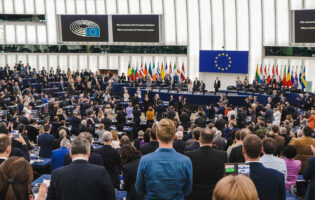“A Small but Fine Piece” – More Small than Fine

Andreas Freytag
Friedrich-Schiller-University Jena
Dr. Andreas Freytag is Professor of Economics at the Friedrich-Schiller-University Jena, Honorary Professor at the University of Stellenbosch, and Visiting Professor at the Institute of International Trade, University of Adelaide. He is also Director of G20 Trade and Investment Research Network. He is a DAAD/AGI Research Fellow in October and November 2023.
Dr. Freytag obtained his diploma from the University of Kiel and his doctorate as well as his Habilitation from the University of Cologne. He has published a number of books and articles in first-class peer-reviewed journals on economic policy, international trade policy, development economics, and international policy coordination. He contributes to blogs and for over ten years had a weekly column on wiwo-online, a German magazine.
During his time at the AGI, Andreas Freytag will focus on the substance and path of tightened transatlantic relations against the background of the systemic competition between the West and autocratic states. The latter comprise some emerging economies, including Russia and China. This escalation has geo-political and geo-economic consequences and makes it necessary to strengthen the ties between transatlantic partners as well as to reach out jointly to attract third countries to the Western values.
To maintain Western leadership in standard-setting as well as helping developing countries to enforce universal human rights and environmental standards, there needs to be a coordinated and broad-based strategy to (1) react to Chinese et al. attempts to define and set standards, which become binding for third countries’ companies. Similarly, (2) due diligence legislation may also be more effective if coordinated across the Atlantic. Although not in the center of analysis, another (3) aspect deals with the transatlantic trade relations as such, which are also in need of a revitalization.
This project focuses on the geo-economic aspects of systems competition although it is difficult to disentangle economic and political relations. It analyzes ways to intensify the transatlantic relations with the objective to maintain economic welfare as well as to position the Western partners better to counter autocracies’ attempts to gain influence in the world economy.
Prof. Dr. Andreas Freytag is a Professor of Economics at the Friedrich-Schiller-Universität Jena and is a frequent contributor to AGI publications and events.
My last column in the AGI Advisor about the rescue package agreed upon in late October 2010 was entitled “The final rescue — or another three months survived!”. Indeed, none of the many EU summits so far were able to tackle the main problem of the European public debt crisis. Just to remind the reader, the core problems of the eurozone (EZ) then were, and still are, a) the level of public debt in almost all member countries, b) disincentives through bail-outs by other governments and monetization of public debt by the ECB, c) the even greater risks through the TARGET2-system and finally d) repressed structural reforms in the EZ.
In October, I predicted a gloomy future for the EZ if governments did not tackle the core problem. The good news is that some countries have already started the necessary reform process before the meeting, and that the Brussels Summit from January 30th has tackled the fiscal problem by agreeing on a fiscal pact, which has been approved by 25 out of 27 EU governments. The bad news is that the loopholes in the fiscal pact are still enormous, and that we again have to trust in an only poorly enforceable European agreement. Since the Summit failed once again to address the bail-out problem, the disincentives for governments to externalize domestic problems by holding other nations’ tax payers hostage are still real. This in turn may lead to less fiscal discipline than the whole continent badly needs. Even more important, the necessary structural reforms to ensure fiscal discipline and competitiveness might also be prevented by bail-outs, which cannot be instrumentalized to ensure reforms and fiscal solidity when the fiscal pact is not enforced.
How relevant this danger is can be seen in the pressure put forward on the EZ’s governments to increase the ESM. Both the Italian Prime Minister Mario Monti and the IMF head Christine Lagarde urged Chancellor Merkel to give in to these demands. However, the dramatic statements by the head of the IMF are misplaced: just a week before Mrs. Lagarde warned the world of a repetition of the 1930s, the funding conditions for Spain and Italy had much improved; there was no need to panic. It is irresponsible and irritating that leading global politicians cannot keep quiet in such precarious situation.
What the Euro requires is a longer period of calm and determined policymakers who are doing their jobs properly. These jobs include addressing the causes for the fiscal problems (unemployment, subsidies, too high military spending, indulgence towards interest groups) and making their economies more competitive. The job description prohibits a hyper-nervous response to every market movement − Ireland being a case in point. Without much ado, the new government started the reform program, which will hopefully bear fruits in due course. Why not sign a silence pact in the EZ next?









